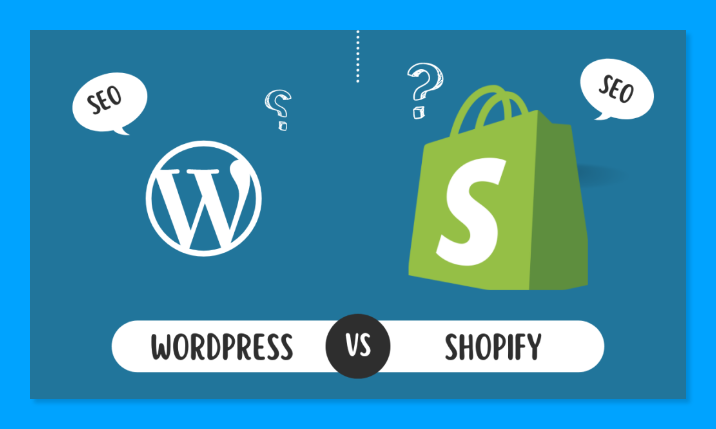“Is WordPress or Shopify better for SEO?” Are you one of the millions of online merchants juggling with this question?
“WordPress or Shopify”-It’s a big fuss among people who want to start their eCommerce store and looking for the best platform to help them with SEO. At the same time, they need a platform that improves their sales and growth and suits their budget too.
WordPress and Shopify are excellent eCommerce platforms, but how will you decide which one is better for SEO?
Before we compare WordPress And Shopify SEO, let’s have a quick look at their SEO inbuilt capabilities.
Is WordPress or Shopify Better For SEO? An Overview-

WordPress SEO
WordPress is an open-source CMS (Content Management System) that was initially designed to create blogs.
Launched in 2003, it has completely revolutionized the content industry and is now home to more than 30,400,000 live websites. The list includes some popular brands such as Bloomberg, The New York Times and Spotify.
Users can craft almost any website using this platform, from business to portfolio websites, an online community to a magazine and digital publishing websites, or Wiki/knowledge to the eCommerce store website. Thanks to changes to the core code and WordPress’s huge ecosystem of plugins and themes!
If you want to learn more about WordPress SEO, read our blog on tips to improve SEO performance in WordPress.
A Little About WooCommerce Plugin-
WooCommerce is a free plugin offered by WordPress that helps you to set up your online store in minutes.
Being a free and easy-to-understand website plugin makes it popular among users. It provides website owners with excellent features to customize their eCommerce stores, especially when it comes to SEO optimization.
After the small intro about WordPress, it’s time to dig deeper into its pros and cons in detail-
Pros Of WordPress SEO
1. SEO Optimized Code
The one thing that makes WordPress a leading eCommerce platform is its strong grip over SEO aspects. Users can create multiple tweaks on their website and get desired results.
It allows you to make changes in your online store’s metadata, URL and attach numerous plugins to ensure that you have a highly optimized website.
You can even download various plugins to access all the source code on a WooCommerce website.
2. SEO Plugin
WordPress helps you win the SEO game by offering external third-party plugins. One of the most popular plugins that WordPress offers is the Yoast SEO plugin which lets you personalize website aspects such as meta descriptions, images, database access, heading tags, etc.
3. Blogging Support
WordPress was initially introduced as a blogging platform. It is something that sets it unique from other platforms.
It has revolutionized the content marketing industry. Many popular bloggers have started their journey through WordPress-backed blogging.
WordPress users can boost their SEO by incorporating a blog-based business into their strategy.
Furthermore, it offers structured data support that helps in content optimization for an online store.
4. Better URL Customization
With WordPress, you can manage your permalinks, which the Search Engine crawler can easily understand. WooCommerce offers endless customization options.
Cons Of WordPress SEO
WordPress offers great benefits for search engine optimized eCommerce store, but at the same time, it has many shortcomings, such as-
1. Manual SEO Expertise
As WordPress is a self-hosted WordPress website. It needs manual expertise to optimize your site. A non-technical person might find learning to optimize the content challenging. Moreover, many details are to be manually inserted by WordPress, and one may not be sure while working with it for the first time.
2. Slow-speed
WordPress lags in the speed area. WooCommerce takes time to load due to its highly tweaked user source codes. Poor site plugins, hosting server, database optimization and image resolution problems in WordPress can put more load on the site and makes it slower.
3. Poor Customer Support
Customer support is not top-notch, especially for themes and plugins. You have to submit a ticket on the support forum to get your queries answered. Even after that, if the problem exists, you will have to search for a solution on your own on the platform.
4. Unresponsive Themes
General WooCommerce architecture is SEO friendly, but many of its themes are not mobile-optimized. It might increase the risk for any website owner if the user tries to browse the site on their smartphone, which is a major disadvantage.
5. Security Risk
WordPress does not include SSL encryption protection as part of its package. Thus, it becomes your responsibility to keep your site secure.
6. Ongoing Maintenance
WordPress eCommerce requires ongoing maintenance and regular updates that can be unmanageable at times.
Is WordPress or Shopify better for SEO? Which one will help you scale and grow faster?
We have seen the good and bad about WordPress, and now it’s time to learn about Shopify.
Shopify SEO
Shopify powers more than 3.9 million live websites worldwide and over 2 million merchants.
For beginners, Shopify is a sales-centric eCommerce platform that helps to develop and run an eCommerce business smoothly.
But more than building a stunning online store, you need to put more effort into making it visible to your customers. Isn’t it?
YES, here Shopify shines. It offers multiple ways to optimize your Shopify website for search engine giants. This platform will allow you to attract higher organic traffic and increase sales.
That said, is WordPress or Shopify better for SEO? Let’s look into the good side of Shopify first-
Pros of Shopify
1. SEO-ready Platform
Good SEO can help you beat your competitor through a higher ranking in the same niche. Here, Shopify can help you. It has excellent built-in, easy-to-use SEO features. Furthermore, it automatically creates your sitemap (A blueprint of your site) that instructs the search engine to crawl through it. Shopify enables you to customize essential SEO data, such as META Tags and title descriptions.
Additionally, it has some other features, such as canonical instructions, URL customization, 301 redirects, etc., to boost your SEO efforts.
Shopify has eliminated some of the more technical aspects of SEO from the average users. These high-end, built-in features let you perform eCommerce website SEO by yourself.
2. Mobile-friendly
Nowadays, everyone wants everything to be accessible on their phones. In such a scenario, having a mobile-optimized eCommerce store is a must. There is no way out!
One of the primary ranking measures that Google use is mobile optimization. Just imagine, if your site doesn’t work well on mobile screens, you’ll be at a big loss.
Shopify has all the essential features to make your site work well on mobile devices using a mobile theme architecture. Essentially, they ensure that your store is guaranteed to be optimized for mobile and thus highly ranked for mobile SEO.
3. High Speed
Do you know 53% of users would leave the site if it takes longer than three seconds to load?
Yes! Website Load Time Matters!
This is where Shopify overpower WordPress/WooCommerce or other self-hosted platforms.
Two factors majorly contribute to Shopify’s speed. One is- Shopify’s architecture depends on lightweight, less resource-intensive apps. Another factor is that all Shopify online stores are hosted on their platform, and back-end server technology improves their functioning to ensure premium speed.
4. Provides SSL Certificates
Shopify automatically provides SSL certificates as part of the monthly fee. Whether you have registered your domain through them or not, you’ll still get the authentication certificate.
This ensures that all stores are authentic and safe for users to share their information. The absence of SSL would result in strong SEO penalties.
Furthermore, not only can you save a high SSL certificate fee, but you will get a boost in ranking because search engines identify a website with SSL.
5. Third-Party SEO Apps Available
Shopify’s app store has a range of fantastic SEO applications to boost SEO efficiency in your online store. With these applications, you need not put much effort yourself.
Is WordPress Or Shopify better for SEO? You’ll not get this answer till the time you look at the shortcomings of Shopify.
Cons Of Shopify SEO
1. High Cost
Shopify is expensive; $29/month for the basic package. No doubt, Shopify websites are eCommerce stores; they are different from a standard website with loads of content and other features.
Also, the applications you’ll install to improve your online store come with a pricy tag. Without those costly applications, you won’t be able to optimize your eCommerce store. Thus, it doesn’t stack up against WooCommerce’s one-time fee.
2. URL Structure Customization is Limited
For any website, a well-refined URL structure is crucial. Messy, long and irrelevant URLs containing nonsensical alphanumeric characters may confuse the search engine as well as the users.
Google penalizes such eCommerce stores. Unlike WooCommerce, Shopify doesn’t provide the flexibility to customize the URLs.
3. Lack of Built-in Features
Shopify’s SEO practices depend greatly on third-party app support. It has fewer in-built features, making users doubtful about the functionality.
However, it has ample applications, but the dependence is too much. At the same time, it has multiple features to allow you to optimize the store, but they are paid.
4. Limited Blog Capability
For SEO, the importance of content cannot be underestimated. High-quality, informative and engaging content can directly boost your SEO ratings. Also, Google puts a heavy weight on the quality of your site content.
Unfortunately, Shopify has less blogging capability than WordPress. Though your Shopify website can have a blog, it lacks the powerful blogging features of WordPress-powered sites.
Nevertheless, if you go with Shopify for setting up your eCommerce store, you can take help from its some of the free SEO apps and tools to make it more SEO friendly.
Final Thoughts: Is WordPress Or Shopify Better For SEO?
Best SEO practices will surely bring the desired results when used consistently. WordPress and Shopify are the best eCommerce platforms with fantastic features to allow users to get the most out of them.
Though the debate on two popular platforms has been going around for a while, it all ends when you understand your SEO needs. Both platforms have pros and cons when it comes to SEO services, pricing and flexibility. Also, it will be decided by your level of technical aptitude.
Again, the choice of platform majorly depends on your business needs. While WordPress gives you complete control over your SEO aspects, Shopify gives you speed.
On the other side, WordPress has the impressive blogging capability, while Shopify lags there. If Shopify has a quick loading time, WordPress shines in the SEO-optimized content. Both platforms provide state-of-the-art SEO accommodations to boost the ranking of your eCommerce store.
Again, choosing any of them solely depends upon your requirements.
Is WordPress Or Shopify Better For SEO? Let’s Keep It Simple-
Go for WordPress if you are looking for a high degree of versatility, backed up by an excellent WordPress CMS. Also, if you want a lot of SEO control at your fingertips, WordPress is the best option.
Shopify is an excellent choice if you want a fast, secure, easy-to-use platform. Your store will work well superbly with minimal customization. If budget is not a constraint, Shopify will be the right choice, with premium features to match your online store’s SEO needs.
Last But Not Least!
The decision also gets affected by how much technical expertise you are ready to put in. While WordPress offers you everything to try your technical skills and SEO knowledge, Shopify has many great tools that work with just a click.



